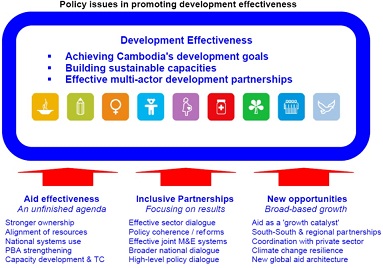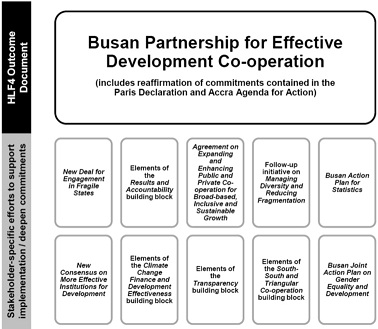

|
Technical Working Group Network Retreat 27-28 February 2012 Discussion Note
Background to the meeting and purpose of this note The TWG Network brings together all TWG Chairs, secretariats, development partner focal points and Heads of Cooperation, as well as representatives of civil society. The Network meeting in February provides an opportunity to discuss policy matters related to development cooperation and partnership as the Government looks towards promoting the principles of 'development effectiveness' (set out in the 2011 Development Effectiveness Report) with a view to updating the current policy on development cooperation management. The NSDP Mid-term Review and the recent High-level Forum in Busan provide essential national and global inputs to the dialogue. This note sets out some of the issues to be discussed so that TWG Network members can consult within their respective organisations and come fully briefed and prepared for the meeting on 27 February.
Objectives of the TWG Network retreat The objective of the meeting is to reflect on a range of issues related to the effectiveness of our development partnership: (i) the effectiveness of partnership arrangements for policy dialogue; (ii) progress in using the implementation tools that we currently employ (PBAs, JMIs, major reforms) to strengthen country systems, improve public service delivery and promote development effectiveness; (iii) monitoring and mutual accountability in the development partnership; and (iv) development cooperation policy (which will be reviewed during 2012 and revised in 2013).
The NSDP Mid-term Review, the 2011 Development Effectiveness Report and the Busan Outcome Statement will be the principal inputs to our discussion. By the end of our meeting we expect to have reached a broad consensus on matters related to development cooperation policy priorities and an approach towards strengthening our organisational arrangements for dialogue and monitoring using a results-based approach.
Related issues for discussion The over-arching theme of the meeting is to identify measures to promote development effectiveness, i.e. the achievement of sustainable results, the strengthening of capacities and systems, and the formation of broader and more inclusive development partnerships. There are a number of inter-related and mutually dependent topics to be discussed.
By considering the broader development context, priorities and challenges, the TWG Network can then focus on identifying the key results areas – and associated actions – that are required. A proposed structure for dialogue The proposed sequence for discussion – on which the agenda is based – is detailed below. The first part of our meeting begins with three main areas for presentation and discussion: (a) the NSDP mid-term review; (b) the Busan High-level Forum commitments; and (c) adapting Busan to Cambodia's own situation and priorities. Discussing and understanding these topics will provide the context for moving into the more forward-looking part of the 2-day programme that will focus on dialogue arrangements, monitoring and policy priorities for the development partnership.
The proposed structure for the discussion is therefore as follows:
1a) NSDP – overall development context The NSDP Mid-term Review identifies good progress in the implementation of each component area of the Rectangular Strategy – Phase II. The review emphasises the following priorities in some of the main areas of the Rectangular Strategy:
In summary, the NSDP Mid-term Review (p xiv) observes:
"Across ministries and at decentralized levels, the main problems faced are:
1. Acute shortage of both physical and human resources; 2. Limited reform in civil services which shows up in poor ‘command and control’ mechanism; 3. Limited horizontal and vertical dialogue between ministries & departments, & between national & sub-national levels; 4. Lack of harmonisation between different programmes; 5. Excessive reliance on ‘project-based’ approaches; and 6. Low quality M&E: lack of standardization of definitions of variables, no linkage between different data-generating agencies, few datasets, and limited knowledge about data among government personnel"
This implies that the major reform programmes of the Royal Government remain highly relevant in addressing each of the six summary challenges by strengthening institutional reforms, creating stronger organisations and systems, and developing capacities across society.
Discussion: The TWG Network will be asked to consider the perspectives of the NSDP Mid-term Review and to consider how they fit with their own sector context and programmes of action, as well as monitoring systems, for 2012 and the medium-term.
1b) Busan and a partnership/cooperation policy for Cambodia – what does the new global framework for development effectiveness look like? In November 2011, the global development community met in Busan, Republic of Korea, to review progress in implementing the Paris Declaration on Aid Effectiveness (as well as the 2008 Accra Agenda for Action) and to agree the successor document, the "Busan Partnership for Effective Development Cooperation".
Key features of the Busan Partnership commitments include:
For Cambodia the most relevant aspects of the agreement include:
(a) The use of a national results framework as a common tool to assess development impact and to support coordination and mutual accountability around key results (paras 18b & 35a). (b) Country systems are now to be used by development partners as the "default option", including use of joint system assessments and approaches to capacity development (19a). (c) Sustainable impact requires a focus on "effective institutions" (29) that includes development partners adopting a more shared approach to risk management (18a). (d) A commitment to country-led coordination arrangements, including PBAs (25a), includes a commitment to delegate greater authority to development partner field staff (25d). (e) Building more strategic partnerships with other development actors: Parliament & local government (21); civil society (22); South-South (30); private sector (32). (f) Promoting policy coherence with other development challenges: gender equality (20); social protection (27); anti-corruption (33); climate change (34).
Discussion: The TWG Network will be asked to review the Busan outcome statement in order to validate the issues that CRDB/CDC has identified as most relevant.
1c) How do we adapt the Busan global commitments to Cambodia's priorities? The 2011 Cambodia Development Effectiveness Report identifies a set of national priorities that are consistent with the global commitments made in Busan (see below the diagram that demonstrates the close match between the principal respective areas of national and global focus). | ||||||
"Click on the image below to view full size"
|
Source. Cambodia DER 2011 (p24) Source. OECD WP-EFF (December 2011)
Perhaps the most relevant and over-arching of the Busan commitments is:
"We will hold each other accountable for making progress against the commitments and actions agreed in Busan …To this end we will … At the level of individual developing countries, agree on frameworks based on national needs and priorities for monitoring progress and promoting mutual accountability in our efforts to improve … development results." Busan Partnership for Effective Development Cooperation (2011), para 35
This requires that we first agree on priorities before developing the institutional and monitoring frameworks that can ensure improved development results. RGC therefore proposes that, in order to move forward in implementing the policy recommendations included in the NSDP mid-term review and the 2011 Development Effectiveness Report, and to ensure relevant adaptation of the Busan commitments to the national context, our development partnership should consult on, validate and prioritise the issues and policy actions discussed in the earlier sections.
Consultations on dialogue arrangements, monitoring and policy work The second part of the discussion provides an opportunity to consult on, and prioritise, the issues developed during the first part of the Network meeting. This session will begin in plenary with selected discussants in order to allow for a general dialogue as well as clarifications. Work in greater detail will then take place in smaller groups amongst the TWGs.
2a. Developing a framework for strengthening partnerships and prioritising results in the management of development cooperation Development effectiveness has been defined in the 2011 Development Effectiveness Report as: ensuring impact; promoting sustainability; and effectively coordinating all actors in the development effort. From the TWG and sector perspective, it is useful to consider how the development effectiveness approach can be further developed and applied to promote development results.
Some or all of the following questions can be used to guide a focused discussion amongst TWGs:
2b. Monitoring the partnership and its effectiveness
Conclusion of the meeting – reaching consensus on actions and the main areas of policy work The themes identified in 2(a) and 2(b), above, will be discussed in smaller groups at the TWG Network meeting before using a plenary discussion to agree on the priority areas on which further work is to be focused as well as to identify the major issues to be clarified in forthcoming policy work. By the conclusion of the meeting we hope to have identified a broad consensus on an approach towards strengthening our organisational arrangements for dialogue and monitoring that promotes a results-based approach consistent with our overall approach to development effectiveness.
These discussions will inform further review work to be led by CRDB/CDC throughout 2012 and supported by the Partnership and Harmonisation TWG. This more in-depth work and consultation process will, in turn, contribute to the production of new development cooperation and partnerships policy that is expected to be finalised in 2013 (i.e. to replace the 2006-2010 Strategic Framework for Development Cooperation Management). This policy will address each of the three main areas discussed above as well as codifying practice in other areas of ODA management and partnerships work (e.g. bilateral consultations on country programming, provision of data to promote aid predictability and transparency, technical cooperation management). |